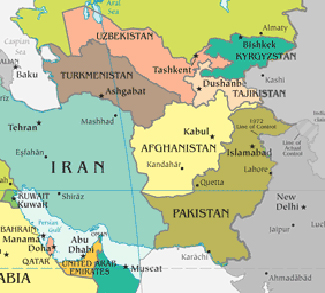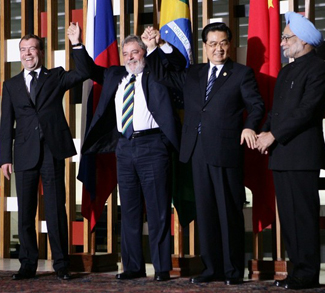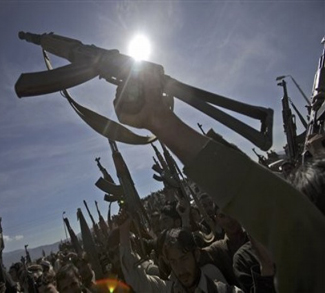FORECAST
If the financial crisis caused by Wall Street manages to diminish Washington’s prestige, ability to influence policy, and deters allies from following the US’ lead on foreign policy, it will achieve what 50 years of near nuclear confrontation with the Soviet Union failed to do—the dissolution of the American Empire.
Washington’s bailout of Wall St. this past week was the lesser of two necessary evils, a devaluation of sorts. Consequently, it was also announced that the national debt clock in Times Square, which has been calculating the national debt by bulk and per US family, actually ran out of digits this week, further evidence of fiscal irresponsibility. By any existing definition, the US appears to be bankrupt. Their military forces are overextended around the world and appear to be losing control in their current theaters of operations, although some would argue that control was never really established.
A development of particular interest that would indicate faltering American influence is the case of Iceland. As the three largest banks in Iceland failed, the government asked Russia for a bailout. Russia agreed. On the surface this development may seem minor as the financial relationship between Russia and Iceland was confirmed during the collapse of the Soviet Union. Many former Soviet elites moved their personal wealth to Iceland for reliable safekeeping following collapse of the Soviet Union. However, from a geopolitical perspective there is more to read between the lines.
Iceland is the only NATO member that has no standing military forces and its sole purpose is to provide a mid-Atlantic stop enroute from North America to Europe for aircraft and naval ships. Iceland’s contribution is to offer facilities for replenishment and refueling. It would appear that Washington was in no position to offer financial assistance to this important NATO ally, while Moscow was very willing to continue its resurgence onto the world stage.
Although the US has not quite lost its hegemonic capabilities, it is waning, and the financial crisis seems to be accelerating this loss. Its foreign policy in Iraq, Afghanistan, North Korea and Iran is set to fail, relations with former lukewarm partners such as Russia have turned cold and there is an inability among US allies to agree on paramount foreign policy issues such as Iran.
The American Empire would not be the first empire undone by poor fiscal policy. The Roman Empire could not be defeated militarily, however one of the lesser-known factors of its collapse was the devaluation of currency resulting in hyperinflation. Similarly, the US has one of the most advanced militaries in the world, unlikely to be defeated in an all out battle for survival, but its military capabilities cannot save Wall Street.
It appears that the fallout from the crisis on Wall Street will not just render the overcorrection of an artificially manipulated “free” market, but a geopolitical shift that will see the sun begin to set on the American Empire.
SUMMARY OF EVENTS: October 6 – 13, 2008
WORLD
Wall Street suffered through another traumatic session Monday, with the Dow Jones industrials plunging as much as 800 points and setting a new record for a one-day point drop as investors despaired that the credit crisis would take a heavy toll around the world. The Dow also fell below 10,000 for the first time since 2004, and all the major indexes fell about 5 percent.
Finance chiefs of the world’s major economies pledged on Friday to take decisive action and work together to stem the escalating financial crisis after another day of gut-wrenching drops on world markets.
NORTH AMERICA
United States
The United States voiced concern over Syria’s military build-up at its northern border and said the recent massive bomb attack in Damascus must not be used as a pretext to get its forces back into Lebanon.
U.S. officials called for a “forceful and coordinated” global response to the credit crisis on Monday as financial market confidence cratered despite another heavy dose of central bank lending.
The U.S. Department of Defense denied Tuesday reports that Iran forced a U.S. warplane to land in Tehran.
Stocks tumbled for a fifth straight session on Tuesday, capping the Dow’s biggest five-day point loss ever, as fears mounted that the rapidly spreading credit crisis would drag the economy into a deep recession.
The United States will appeal to NATO allies on Thursday to send more troops to fight Taliban insurgents in Afghanistan, despite the prospect of spending cuts because of the global financial crisis.
In a rare coordinated move, the Federal Reserve and other major central banks from around the world slashed interest rates Wednesday to prevent a mushrooming financial crisis from becoming a global economic meltdown.
Americans’ retirement plans have lost as much as $2 trillion in the past 15 months — about 20 percent of their value — Congress’ top budget analyst estimated Tuesday as lawmakers began investigating how turmoil in the financial industry is whittling away workers’ nest eggs.
The sheriff of the third-most populous U.S. county halted evictions on foreclosed properties on Thursday, saying innocent tenants were being put on the street. But bankers said he was breaking the law.
Treasury Secretary Henry Paulson said on Friday the United States was developing plans to buy equity in financial institutions if necessary to halt market turmoil.
WESTERN EUROPE
Iceland
Iceland on Tuesday nationalised the second of its three largest banks, locked its currency into a fixed exchange system and sought a large loan from Russia to fend off potential national bankruptcy.
EASTERN EUROPE
Russia
Russia accused Georgia on Monday of trying to sabotage a French-brokered ceasefire by mounting a series of violent attacks on Russian targets across the region, but Tbilisi said the allegation was baseless.
The Russian stock market gave in to panic on Monday with the MICEX dropping 18.6% to 752 points and the RTS falling by 19.1% to 866.39 points – the worst losses since the 1998 crash.
Russia will pull back on Wednesday from the southern edge of a buffer zone inside Georgia next to South Ossetia, a Russian officer said Tuesday as EU monitors watched to see if Moscow would meet its withdrawal deadline.
Russia pulled back its troops on Wednesday from buffer zones it set up on Georgian territory during a summer war, but Georgia demanded it take further steps before a deadline of Friday.
Russia has no plans to provide Iran with the S-300 anti-aircraft missile defense systems, a Russian Foreign Ministry spokesman said on Thursday.
MIDDLE EAST
Turkey
The Turkish parliament on Wednesday extended for one year a mandate to conduct cross-border operations in northern Iraq against the separatist Kurdistan Workers Party (PKK) militants.
EAST ASIA
Asia stocks dropped sharply on Friday, with Japan’s Nikkei plunging 11 percent, while the yen and gold rose on growing fears that no government effort so far has rejuvenated credit markets or kept the global economy from a path to recession.
SOUTH ASIA
Afghanistan
U.S. intelligence agencies conclude in a draft report that Afghanistan is in a downward spiral and they doubt whether the Kabul government can stem the Taliban’s rise, The New York Times reported on Thursday.
NATO defense ministers on Friday agreed to raise the percentage of troops deployable in overseas operations from 40 percent to 50 percent, said NATO Secretary General Jaap de Hoop Scheffer.
India
India is to launch its first unmanned mission to the Moon this month as it struggles to catch up with China in a 21st-century Asian version of the space race between the United States and Soviet Union.
Pakistan
Officially, Pakistan’s central bank holds $8.14 billion (£4.65 billion) of foreign currency, but if forward liabilities are included, the real reserves may be only $3 billion – enough to buy about 30 days of imports like oil and food.
Sri Lanka
The Sri Lankan Air Force carried out more raids on Tamil Tiger rebels’ positions in the north, the military said Friday.
AFRICA
Angola
Both the United States and the Angolan government have ruled out the establishment of the U.S. African Command (AFRICOM), Angola’s official news agency ANGOP reported on Thursday.
Marco is a contributor to Geopoliticalmonitor.com



